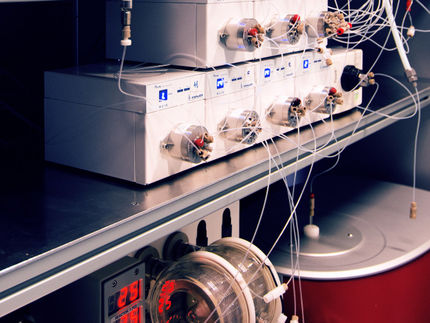Inhoffen Medal 2019 awarded to specialist for synthetic organic chemistry
Advertisement
Medically relevant compounds can often be found in nature. To make them suitable for drugs, they need to be isolated from their natural sources. If sufficient quantities of the agent cannot be isolated in that manner, chemical synthesis comes into play. Without chemical synthesis, many agents were not available for the industrial production of drugs. Phil S. Baran of the Scripps Research Institute in La Jolla, USA, aims to develop the “perfect synthesis”. His methods and reagents are applied in fundamental chemical research and in the production of pharmaceuticals. They are commercially marketed with much success. In honour of his outstanding achievements, he is being awarded the Inhoffen Medal by the “Friends of the HZI”, the sponsors' association of the Helmholtz Centre for Infection Research (HZI).
“HZI and Technische Universität Braunschweig celebrate the award of the Inhoffen Medal which is given in recognition of world-leading research in the field of total synthesis of natural agents. In just a short period of time, Phil Baran has revolutionised the synthesis of organic natural compounds and set innovative impulses in synthetic methodology as well," says Prof Peter H. Seeberger, laudator and director of the Max Planck Institute of Colloids and Interfaces, in honour of Baran's achievements.
Phil Baran majored in chemistry at the New York University and received his doctorate in 2001 at the Scripps Research Institute (SRI). He then worked as a scientist at Harvard University and returned to the SRI in 2003 to set up his own research group. He has received numerous awards including a Mukaiyama Award, the Emmanuel Merck Lecture and a MacArthur Fellowship.
The Inhoffen award of the HZI sponsors' association, worth €8000, is the most prestigious German award in the field of natural substance chemistry. The award will be presented in the scope of the Inhoffen Lecture, a joint event of HZI, Technische Universität Braunschweig and the Friends of the HZI. The ceremony is scheduled to be held on Friday, April 12, at 15 pm in the Forum of the HZI.
In the scope of the Inhoffen Lecture, the HZI sponsors' association also honours outstanding doctoral theses in life sciences. This year's sponsor awards, worth €1000 each, go to Dr Katharina Borst of the TWINCORE - Centre for Experimental and Clinical Infection Research and to Dr Michael Kany of the Helmholtz Institute for Pharmaceutical Research Saarland, a branch location of the HZI. Borst researched the behaviour of myeloid liver cells during infection with viral hepatitis, whereas Kany investigated patho-blocker targets in pathogenic bacteria.
Other news from the department science
Most read news
More news from our other portals
See the theme worlds for related content
Topic world Synthesis
Chemical synthesis is at the heart of modern chemistry and enables the targeted production of molecules with specific properties. By combining starting materials in defined reaction conditions, chemists can create a wide range of compounds, from simple molecules to complex active ingredients.

Topic world Synthesis
Chemical synthesis is at the heart of modern chemistry and enables the targeted production of molecules with specific properties. By combining starting materials in defined reaction conditions, chemists can create a wide range of compounds, from simple molecules to complex active ingredients.





























































